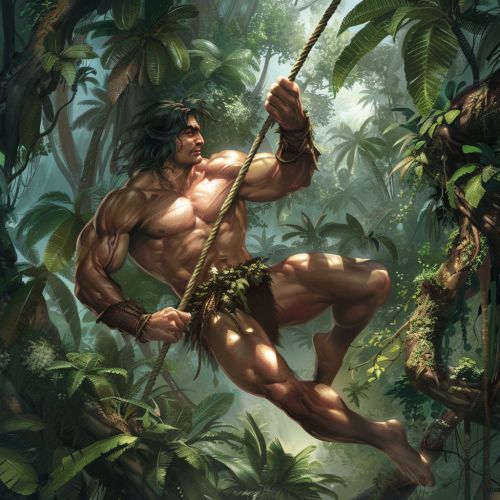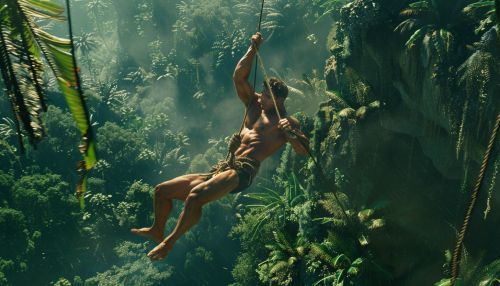The Legend of Tarzan
The Legend of Tarzan


The Legend of Tarzan is a multifaceted narrative that has evolved over more than a century, encompassing literature, film, television, and other media. Created by Edgar Rice Burroughs, the character Tarzan first appeared in the novel "Tarzan of the Apes" in 1912. The story of Tarzan, an orphaned boy raised by apes in the African jungle, has captivated audiences with its themes of nature versus civilization, identity, and survival.
Literary Origins
The character of Tarzan was introduced to the world in the novel "Tarzan of the Apes," serialized in the pulp magazine "All-Story Magazine" in 1912 and published as a book in 1914. Edgar Rice Burroughs crafted a narrative that combined adventure, romance, and a critique of contemporary society. The novel's success led to a series of 24 sequels, expanding Tarzan's adventures and deepening the lore surrounding his character.
Tarzan's upbringing by the fictional Mangani, a species of great apes, is central to his identity. The Mangani language, which Tarzan learns, is a constructed language created by Burroughs. The novels explore Tarzan's dual identity as both a wild man of the jungle and John Clayton, Lord Greystoke, his aristocratic heritage.
Adaptations in Film and Television
Tarzan's transition from literature to film began with the silent film "Tarzan of the Apes" in 1918, starring Elmo Lincoln. This adaptation was followed by numerous films, with Johnny Weissmuller becoming the most iconic Tarzan actor in the 1930s and 1940s. Weissmuller's portrayal emphasized Tarzan's physical prowess and introduced the famous Tarzan yell.
The character has been adapted into various television series, including the 1966-1968 NBC series starring Ron Ely, which brought a more sophisticated and articulate Tarzan to the screen. Animated adaptations have also been popular, with Disney's 1999 film "Tarzan" introducing the character to a new generation.
Themes and Analysis
- Nature vs. Civilization
One of the central themes in the Tarzan narrative is the conflict between nature and civilization. Tarzan embodies the purity and strength of the natural world, often contrasted with the corruption and decadence of human society. This theme is explored through Tarzan's interactions with both the jungle and the human characters he encounters.
- Identity and Duality
Tarzan's dual identity as both a wild man and an English lord raises questions about identity and belonging. His struggle to reconcile these two aspects of himself is a recurring motif in the novels. This duality is also reflected in his relationships, particularly with Jane Porter, who represents the civilized world.
- Survival and Adaptation
Survival is a key aspect of Tarzan's story. His ability to adapt to the harsh conditions of the jungle and his mastery of various survival skills are central to his character. This theme is explored in detail in the novels, highlighting Tarzan's resourcefulness and resilience.
Cultural Impact
Tarzan has had a significant impact on popular culture, influencing various media and spawning numerous adaptations. The character has become a symbol of the noble savage archetype and has been referenced in literature, film, and television. Tarzan's influence extends to other characters and stories that explore similar themes of nature, identity, and survival.
Criticism and Controversy
- Colonialism and Racism
The Tarzan stories have been criticized for their portrayal of African cultures and the colonialist attitudes inherent in the narrative. The depiction of African characters and societies often reflects the prejudices of the early 20th century, and modern readers may find these aspects problematic.
- Gender Roles
The portrayal of gender roles in the Tarzan stories has also been a subject of criticism. Jane Porter, Tarzan's love interest, is often depicted in a traditional damsel-in-distress role, although some adaptations have sought to present her as a more independent and capable character.
Legacy and Modern Interpretations
The enduring popularity of Tarzan has led to various modern reinterpretations of the character. Contemporary adaptations often seek to address the criticisms of the original stories, presenting a more nuanced and culturally sensitive portrayal of Tarzan and his world.
